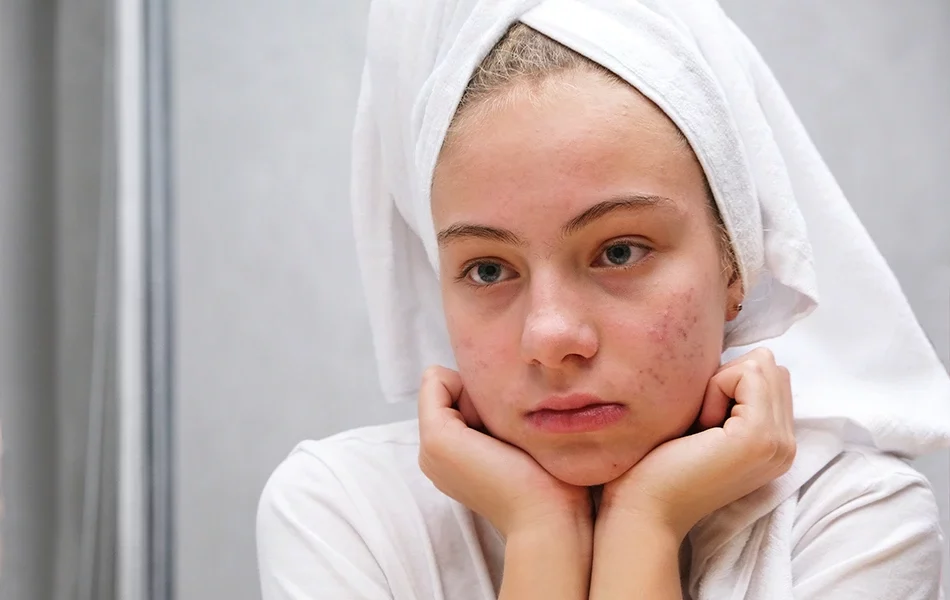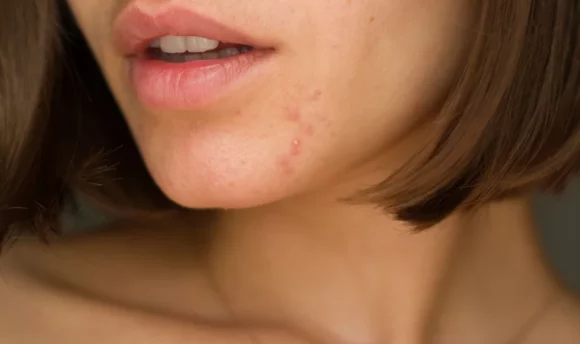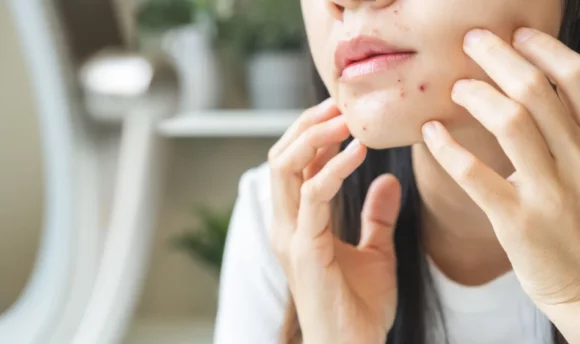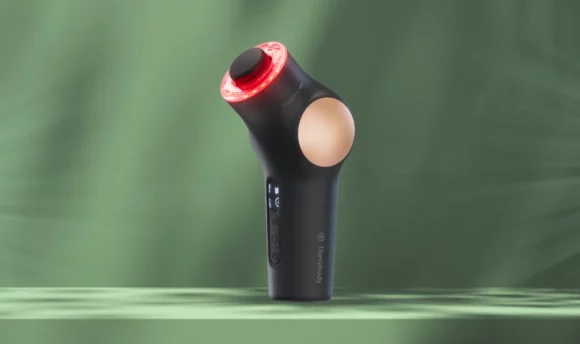Does Biotin Cause Acne? Exploring the Connection
The human body needs biotin, but how does biotin supplementation influence skin health? There is mixed opinion about whether it worsens or improves acne.

Everybody needs biotin to maintain optimal health. The human body doesn’t make biotin itself, so you need to get enough from your diet and, in some cases, supplementation.
Some people take biotin supplements despite getting enough from food as they believe it’s helpful in maintaining healthy skin, hair, and nails. While biotin might work for your hair and nail health, others claim that biotin supplements cause acne.
Keep reading to learn whether biotin supplements can promote clearer skin or worsen acne and other existing skin conditions.
Does Biotin Cause Acne?
There is insufficient evidence to determine if biotin can cause acne. Taking biotin supplements in excess might hinder the absorption of essential nutrients and other B vitamins, including pantothenic acid (vitamin B5), which may contribute to acne breakouts.
Depleting pantothenic acid absorption can be problematic as it may play a role in acne treatment. In a study of patients with moderate acne, supplementation with pantothenic acid for 12 weeks significantly reduced acne breakouts and inflammatory blemishes.
Both biotin and pantothenic acid absorb through the same pathway. With this in mind, if a biotin supplement interferes with the body’s absorption of pantothenic acid or triggers a pantothenic acid deficiency, it may result in acne.
What Is Biotin?
Biotin, or vitamin H, is one of eight B vitamins (vitamin B7). Its main job is to help your body metabolize amino acids, carbs, and fats into energy, but it has other essential functions. Biotin helps maintain your hair, eyes, skin, and nail health and supports the nervous system.
You can get enough biotin naturally from your diet with foods like nuts, seeds, seafood, lean meats, organ meats, egg yolks, broccoli, and mushrooms. Most people don’t need biotin supplements, but there are times when a healthcare provider might recommend them.
For example, a biotin supplement can help manage blood sugar levels in people with type 2 diabetes. Otherwise, supplements are necessary for people with a biotin deficiency. Deficiency is rare and primarily affects pregnant and lactating women, individuals with chronic alcohol exposure, and those with the genetic disorder biotinidase deficiency.
Biotin deficiency signs include weak nails, thinning hair, hair loss, skin rashes, dry skin, dry eyes, conjunctivitis, skin infection, depression, lethargy, and fatigue.
Because of its role in hair, skin, and nails, and the subsequent symptoms of deficiency, biotin is often present in dietary supplements and self-care products that claim to make your hair thicker, your skin clearer, and your nails more robust.
It’s often hailed as a hero ingredient, and biotin supplements for hair growth are generally the most popular.
Benefits of biotin for your skin
The most scientific evidence behind biotin supplements is associated with hair and nail growth. The role of biotin in skin health is less clear, especially in adults who don’t have a deficiency. Most of the research comes from case studies in infants, one of which found that supplementation improved skin rash and dermatitis.
Nevertheless, biotin does appear to support overall healthy skin since it’s needed for energy production and for producing fatty acids and other nutrients. These nutrients may help to support a healthy complexion by hydrating and nourishing the skin.
As you can see with deficiency symptoms, a lack of biotin in your system can wreak havoc on your skin, causing dryness, flakiness, and red rashes around the eyes, nose, and mouth. So, in the case of correcting a deficiency, biotin supplements are likely to offer skin benefits.
Going forward, more research is needed to build a clearer picture of how biotin works for various skin concerns.
Do Biotin Supplements Have Any Side Effects?
Taking biotin supplements might help you maintain healthy skin, strengthen brittle nails, and aid hair growth, but they’re not perfect. Biotin supplements can bring potential problems that may jeopardize your health.
It’s essential to consider the following side effects before increasing your biotin intake with a supplement.
#1 May interfere with the absorption of other vitamins
Taking biotin supplements may prevent your body from absorbing other nutrients since they share the same carrier process as alpha-lipoic and pantothenic acid. Alpha-lipoic acid is used to manage chronic diseases like diabetes, while pantothenic acid is needed to make blood cells and metabolize food.
#2 May not work with certain medications
Certain anticonvulsant medications like carbamazepine or phenobarbital can inhibit the absorption of biotin and deplete biotin levels, raising the biotin dosage requirements. Smoking can also interfere as it causes the body to metabolize biotin more quickly.
Furthermore, taking an oral biotin supplement can lead to false-positive or false-negative results in lab tests using biotin-streptavidin technology. These are often used to measure hormone levels, which may result in patients receiving incorrect diagnoses.
Can B Vitamins Help Treat Acne?
There is reason to believe that your biotin supplements may be causing acne. On the other hand, there is some evidence to support the opposite – that biotin can treat acne.
In one study, the researchers suggest that treatment with biotin may be helpful with comedonal acne – a type characterized by small pimples that occur when the pores become clogged with bacteria, excess oil, and dead skin cells.
The same study supports biotin for acne treatment with topical retinoids by helping to control flaking and skin irritation.
When combined with isotretinoin treatment (an acne medication), taking 10mg of biotin daily can help to maintain skin hydration. This is beneficial for acne treatment since dry skin can trigger the sebaceous glands to increase oil production, resulting in more breakouts.
According to one study, the B vitamins most useful for acne treatment are B1, B2, B3, B5, B6, and B7, primarily because they inhibit sebum secretion and reduce the colonization of acne-causing bacteria. Of all the B vitamins, vitamin B5 seems the most promising for acne.
FAQs
Too much biotin may result in acne breakouts in some people, although the evidence is unclear. It may stem from the excess biotin slowing the absorption of vitamin B5, which plays a role in supporting the skin barrier and is associated with reducing acne breakouts.
Taking biotin in excess may cause a skin rash in some people if they are sensitive to biotin or other ingredients in the supplement. Too much may also trigger acne and breakouts if it stops your body from absorbing other nutrients properly.
You can prevent breakouts from biotin by making sure you don’t overdo it and give your body more than it needs. It can also help to take vitamin B complex instead of a single biotin supplement, as this will ensure you don’t become deficient in other nutrients, like vitamin B5.
A Word From a Dermatologist
Biotin is a water-soluble vitamin that you need to consume from foods. Taking an oral supplement isn’t necessary for most people unless you are deficient in the nutrient. If so, you might experience hair loss, thinning hair, poor nail health, and dry, scaly skin.
As biotin supplementation is an unreliable acne treatment, it’s important to try other methods that help with treating acne. Start with your diet, which should include adequate water intake and all other essential nutrients like vitamins A and E, zinc, and omega-3 fatty acids to help keep your skin clear.
There are multiple skincare hacks you can try, but ultimately you need to focus on a good skincare routine, keeping your face clean, moisturizing appropriately, limiting sun exposure, and managing stress. Additionally, your medical provider may offer prescription medicines.
Conclusion
A biotin deficiency can cause dry skin, rashes, brittle nails, and hair loss, so adequate intake will help to keep your hair, nails, and skin healthy. We know that getting enough biotin is important for your health, but whether biotin results in acne or clear skin has yet to be fully discovered.
Talk to a dermatologist before adding biotin to your regimen, as it might be unnecessary. Most people get enough from diet alone, and taking more could potentially irritate the skin and trigger breakouts. Your dermatologist can guide you toward the best acne solutions, be it supplements, topical creams, or medication.

















































 Select your language:
Select your language: 








